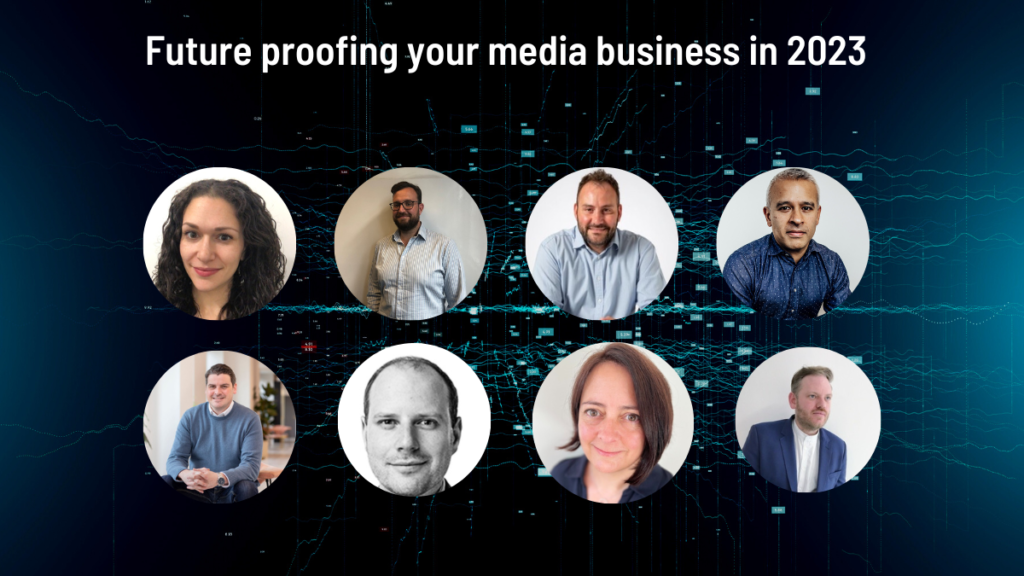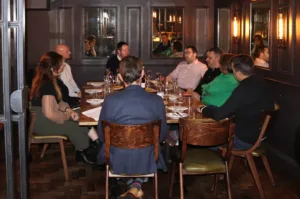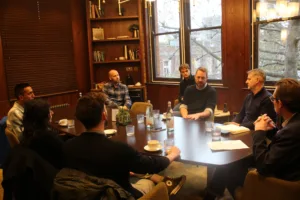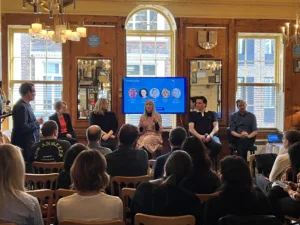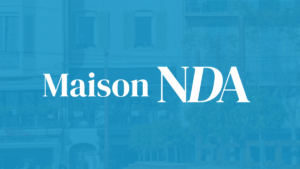There’s no denying these are volatile times. With every economic downturn, the debate rages – to spend or not to spend to maintain brand supremacy? But this is just one of the many challenges facing publishers and advertisers into 2023. Just how do they decide which of the many balls they need to keep in the air to focus on?
In the first part of our roundtable, in partnership with mediarithmics, our panel of experts delve into current challenges, where opportunities might lie and possible solutions to the deprecation of third-party cookies. Chaired by NDA Editor Justin Pearse, the roundtable featured James Florence, Head of Advertising Technology, Immediate; Alex Kirby, Revenue Operations Director, Hello Magazine; Ryan Buckley, Head of Digital, Hearst UK; Jayesh Rajdev, Controller of Advanced Advertising, ITV; Nick Flood, Global Ad Product & Revenue Operations Director at Future; Chris Daniels, Chief Revenue Officer, Haymarket Automotive, Jo Holdaway, Chief Data & Marketing Officer at Independent Digital; and Phil Raby, General Manager International, mediarithmics
None of the attendees could get away from the fact that the industry faces challenging economic conditions into 2023, and probably even beyond. Jayesh Rajdev, Controller of Advanced Advertising, ITV spoke for many when he said “The biggest single challenge for next year is how we convince our advertiser base to continue making a case for sustained investment, to see the opportunity in a downturn for maintaining and growing investment in brand.” And, for the respective voices round the table, to do it via their platform.
Layered on top is the constantly changing nature of the business, with attendees citing a range of issues from a knowledge gap, sustainability, attention metrics and more. It’s a lot to get ahead of and there is small comfort in knowing that everyone is in the same boat.
Some have managed to turn adversity into opportunity. Chris Daniels, chief revenue officer, Haymarket Automotive has been looking for the silver linings. “We’ve gone through a few years where the car industry has gone from one crisis to another and it’s really impacted our business. But, it has allowed us to sit down and think about what we need to be doing. We’ve been doing a lot around commercialising our first party data, we’ve got partnerships in place with other publishers and so for the first time we’ve got quite extensive data deals in place and we’re seeing good volumes of revenue.”
Opportunities are emerging, particularly around focusing on the issues that really matter. Jo Holdaway, chief data & marketing officer at Independent Digital, explained: “There’s loads of really good opportunities and innovation, but we can only do so much. Where can we put our resources to make a real difference and return to the business by investing in growth. We’re using the next six to 12 months as a real opportunity to get our house in order.”
How easy it is to ‘get your house in order’ when the goalposts keep shifting is a matter for debate. The deprecation of the third-party cookie has been hanging over the industry for some time and attendees are still wrangling with how best to approach the issue.
“Over the next few years we’re going to see huge amounts of new regulations [in the US]. Publishers should focus on gaining consent from users and then be able to monetize. You’re having to operate in multi-platforms, multi-privacy environments. Situations that require different systems or consent mechanisms. It’s why no-one spends in Safari because no agencies or advertisers can measure performance accurately. There are multiple areas of business that will be impacted but there’s still a long way to go,” warned Nick Flood, global ad product & revenue operations director at Future.
Various solutions have been mooted to get around the lost performance metrics, including email as ID and logged in visitors but it was agreed this did little to improve user experience – and perhaps plenty to undermine it. Holdaway raised the point that, at some point, the consumer might have to acknowledge there’s a quid pro quo for an open web “There’s an argument in terms of educating a consumer that these premium products aren’t for free. If we’re sending journalists to the Ukraine to cover the conflict on the ground, that’s really expensive.”
“There are a lot of solutions on the market, some of them are futureproof, some provide scale and some don’t. For a lot of publishers, the scale is not quite there so it has to be substituted with a probabilistic solution as well which is why we’re seeing a lot of traction with Universal ID,” suggested Phil Raby, general manager international, mediarithmics
It would appear that the jury is still out. “Universal ID was originally pitched as the one solution that connects everything. When you’ve got hundreds of different solutions, that defeats the purpose,” suggested Ryan Buckley, head of digital, Hearst UK.
“They are slimming down the options but we haven’t made a decision. There are a few that we’ve tested that haven’t worked out, and there are a few that look quite promising, but we’re not committed yet.
“We tested a bit last year and didn’t see a great deal of uplift. You saw them working but measuring them in aggregate across all our inventory probably wasn’t fair,” added James Florence, head of advertising technology, Immediate.
“We’re trying to take a more specific approach. Do we want to broadcast these IDs globally across the whole open auction? Probably not. But in one of our really trusted [partners] in a specific inventory, that’s fair because there’s a value exchange – they’re buying more inventory at higher rates. It’s case by case.”


